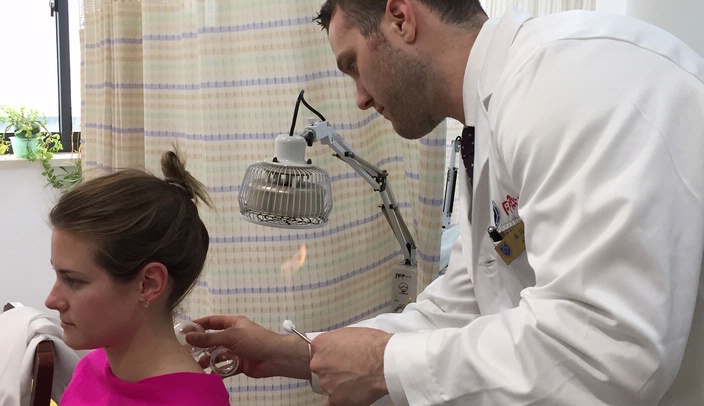Rachel Watson and Matthew Hessel, both fourth-year medical students at UNMC, recently returned from a month-long international medicine rotation in Shanghai. The pair studied at the 10th People’s Hospital of Shanghai, which is affiliated with Tongji University School of Medicine.
(Rachel talked with me before her trip. For that story, click here.)
During the first two weeks of their time at 10th People’s Hospital, Matthew and Rachel studied in the Traditional Chinese Medicine (TCM) Department. They chose this department because "it is something that we have little exposure to in our training at UNMC" and it was a chance to experience "the broader practice of medicine in a foreign country," Matthew said.
TCM is based on the thought that life force, or qi, flows through channels in the body known as meridians. Also important is the balance and interaction of the five phases or elements of wood, fire, earth, metal, and water that are thought to make up the universe and the body. TCM attempts to remove blockages in the flow of qi through the meridians or restore balance in the phases through acupuncture, cupping (creating a vacuum in a cup and placing it on the skin), moxibustion (burning herbs above pressure points), and herbal remedies. TCM is taught and practiced alongside "western" medicine in China.
Matthew and Rachel learned the basics of TCM practices while at 10th People’s Hospital. Near the end of their time in the TCM department, they practiced basic techniques on each other and some patients. Matthew said, "it was a very enlightening experience that exposed us to an unfamiliar medical practice."
During the second half of their time, Matthew and Rachel were in the Department of Nuclear Medicine. There they joined a team of nurses, residents, attending physicians, and the director of the department. The pair observed inpatient care and learned about the CT, PET/CT, and SPECT scanning technology, some of which was made locally.
There were many similarities between inpatient care at UNMC and 10th People’s Hospital, including the make up of the provider team and the way of doing patient rounds. There were differences as well. For example, doctors have more clerical work and patients have more independence than at US hospitals.
Rachel and Matthew’s experiences at 10th People’s Hospital gave them "a widened sense of awareness regarding the worldwide practice of medicine," Matthew said.
The pair also commented on living in a different culture. They tried new foods, dodged traffic when crossing the streets, and enjoyed visiting local landmarks. "We kept an open mind and tried as many different things as we could and were not disappointed!" said Matthew.
Both "highly recommend the international rotation to future students."
To learn more about the international rotation in China, please see the APRDP website.
